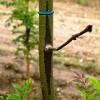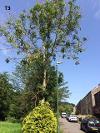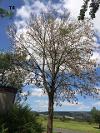How to identify Ash Dieback
Information on what Ash Dieback is, what happens to the tree, and what it looks like
What is it?
ADB is caused by a fungus that originated in Asia. It was introduced to Europe about 30 years ago and has since devastated the ash population across the continent. Our native ash species* (Fraxinus excelsior) did not evolve with the fungus, which means it has no natural defence against the fungus.
*Note it does not affect rowans also known as mountain ash (Sorbus aucuparia).
What happens to the tree?
The fungus overwinters in leaf litter on the ground and then releases spores into the surrounding atmosphere during the summer. These spores can be carried by the wind many miles away.
The spores land on leaves and the fungus then grows inside the tree, eventually blocking its water transport systems, causing it to die.
Trees can fight back, but year-on-year infections will eventually kill it. Young trees are more likely to die quicker than mature trees.
What does Ash Dieback Look Like?
There are several symptoms that may or may not be present
- Lesions on the stems
- Browning of the leaves and early leaf fall
- Retaining their seeds or 'Keys' over the winter
- The foliage in the crown of the tree gradually thins as the disease progresses



There are 4 categories which identify the progress of the disease in the tree. They are:
Category 1 (T1) - 0-25% dieback - A healthy tree with a good healthy leaf coverage. There may be minor signs of disease e.g. early leaf fall, some leaf browning.
Category 2 (T2) - 25-50% dieback - A tree starting to show signs of disease. Reduced leaf coverage/crown density with some other indicators: some leaf browning, lesions or brown keys.

Category 3 (T3) - 50-75% dieback - A tree which is clearly diseased - Significantly reduced leaf coverage/crown density. Tips of branches showing die back, brown keys evident and foliage becomes 'clumpy'.

Category 4 (T4) - 75-100% dieback - A tree which is clearly in terminal decline. Extremely sparse or no leaf coverage/crown density. Large dead branches may be present.





